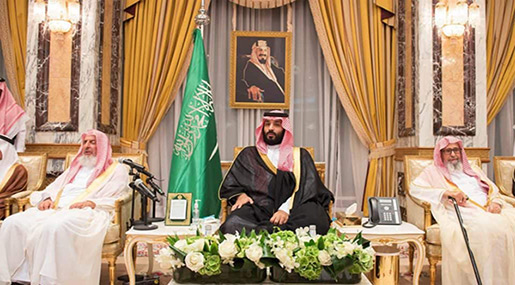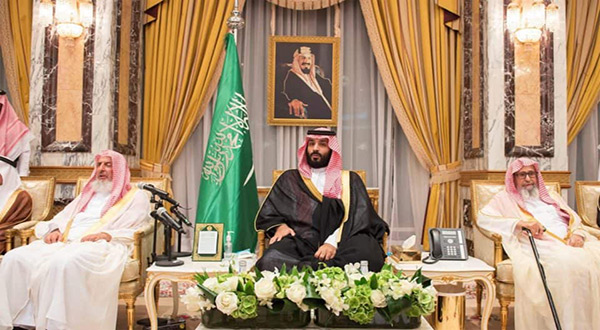
The £700k Hospitality Bill For MPs’ Visits to Repressive Regimes

Cahal Milmo
Saudi Arabia and other autocratic regimes with poor human rights records have spent nearly £700,000 in the last five years on luxury trips for MPs, prompting claims that British politicians are being used to the "launder the reputation" of some of the world's most repressive governments, "i" can reveal.

An analysis of donations received by Parliamentarians shows that a group of nine countries from Bahrain to Azerbaijan have lavished hospitality costing £660,762 on 182 MPs since 2013 - spending an average of nearly £4,000 per participant on perks that include first and business class flights and five-star hotels. More than 80 per cent of the MPs participating in the tours were from the Conservative Party.
Crown Prince
The largest spender is Saudi Arabia, whose de facto leader Crown Prince Mohammad bin Salman arrives in London next week for a visit during which Downing Street is expected step up co-operation with the oil-rich Gulf state in areas from defense to education as part of its push for post-Brexit trade.
Amnesty International has called on Prime Minister Theresa May to "show some backbone" over what it described as Saudi Arabia's "atrocious" human rights record, in particular its key role in the ongoing military campaign and aerial bombardment of Yemen. At the same time, campaigners claim "soft power" is being wielded to deflect such criticism.
Diplomatic relations
The amount spent by the Saudis on hosting MPs rose almost threefold in 2017 to £94,000, including the cost of business class flights and fine dining. Over the five-year period, the kingdom has spent £197,000 on fact-finding missions and bilateral tours for 41 MPs "to strengthen British - Saudi Arabian diplomatic relations".
Saudi Arabia and three other Gulf countries, all of them facing allegations of human rights violations, accounted for the four largest spenders on foreign trips by autocratic regimes, according to the data from the Register of Members' Interests. The United Arab Emirates (UAE) has spent £124,000 since 2013, Bahrain £116,000 and Qatar £106,000. By contrast the amount spent by the governments of Britain's closest democratic allies in North America and the European Union on hospitality for MPs over the same period was zero.
Reform
Senior MPs who have participated in the trips told "i" that the visits were vital to make informed judgments about countries whose actions are scrutinized in Parliament and engage with their regimes to encourage reform.
But campaign groups said that the spending raised serious concerns about a concerted public relations strategy to target MPs and improve the image of repressive regimes in the Middle East and beyond.
Both Saudi Arabia and UAE have been repeatedly criticized for their lead roles in the ongoing military campaign in Yemen - a conflict during which Britain has sold weaponry such as smart bombs and missiles to the Saudis worth at least £1.9bn.
‘Poor judgment'
Duncan Hames, director of policy at Transparency International UK, the respected governance watchdog, told i: "Whilst the modern world requires engaging with diverse foreign powers with mixed reputations, some MPs seem overly keen to be entertained on all-expenses-paid trips, many of which appear to have little relevance to their Parliamentary duties. At best this reflects poorly on their judgment, but at worst it secures speeches flattering the reputation of corrupt and repressive regimes."
Andrew Smith, of Campaign against Arms Trade, which obtained the figures, said: "This is reputation laundering in action. These regimes are not spending so much money on expensive flights and hotels for MPs in order to be kind. They are doing it to win friends and increase their influence in Westminster. If MPs want to stand up for human rights and democracy, then they should not accept fancy flights and hospitality from despots and dictatorships."
There is no suggestion that the visits to the nine countries - Saudi Arabia, Bahrain, UAE, Qatar, Egypt, Kazakhstan, Pakistan, Oman, Azerbaijan - broke Parliamentary rules. MPs from all major parties, including Labor, the Liberal Democrats and the SNP, participated.
International forums
...
In September last year, Saudi Arabia spent £7,800 per head to host four Conservative MPs, including Leo Docherty, head of the Conservative Middle East Council, for a six-day visit that included an audience with the autocracy's monarch, King Salman. Similarly, UAE paid £3,500 per head for eight MPs - seven Tory and one Labor - to meet ministers and business leaders.
Written questions
Mr Docherty, a former British Army officer who served in Iraq and Afghanistan, was criticized after he did not declare the visit to Saudi Arabia when he subsequently submitted written questions in Parliament regarding arms sales to the country and military co-operation.
Parliamentary rules require MPs to be "open and frank" by drawing attention to any relevant interest in proceedings. Mr Docherty did not respond to a request from me to comment.
Among the most prolific attendees on foreign tours have been Alistair Burt, who has been a junior Foreign Office minister for the Middle East since last June. Mr Burt undertook nine paid-for trips since 2013, including five to UAE (among them a £10,000 visit last November accompanied by his wife to attend a foreign policy forum) and three to Bahrain.
Mark Menzies, whose Lancashire constituency is home to the BAE Systems factory which builds the Eurofighter Typhoon jet sold under multi-billion pound contracts to countries including Saudi Arabia and Qatar, has been on eight visits, including three to Saudi Arabia and three to Azerbaijan.
Human rights
All the MPs approached by "i" insisted they had raised human rights issues during their trips.
Mr Menzies, who is chairman of the APPG on Saudi Arabia, said he had lobbied on issues ranging from gay rights to in Azerbaijan to bombing in the Yemen. He said: "The cost of these fact-finding and relationship-building visits should be borne by the British taxpayer wherever possible. However, that does not stop us questioning these countries and their governments. Far from it."
"These visits help raise our awareness of the situation in these countries, many of which we trade with. Saudi Arabia is undergoing huge modernization and change and it has been a privilege to see it happening.
"It is important we maintain strong links with these countries while they undergo these changes."
‘Regular contact'
Mr Burt, who had previously served as Middle East minister between 2010 and 2013, underlined his longstanding involvement in the region.
He said: "Holding regimes to account on issues such as human rights is not about occasional passing campaigns. It is about regular contact, considered discussion, and colleagues from many countries working in concert.
"These discussions are not about ‘fact finding' - the facts are often quite plain - they are the building blocks of international diplomacy, and an important tool for both the UK Government and Parliament."
It is understood that Mr Burt's wife had received a separate invitation to attend a foreign affairs summit in UAE.
Bilateral partnership
Neither the Conservative Party, nor the governments of Saudi Arabia, UAE and Qatar responded to a request to comment from "i".
In a statement, the Bahraini government's National Communication Centre said: "Bahrain enjoys good relationships with many countries around the world, including the United Kingdom. As part of this relationship visits are made by Members of Parliament for both sides in order to maintain and strengthen this bilateral partnership."
Source: iNews, Edited by website team
Comments



